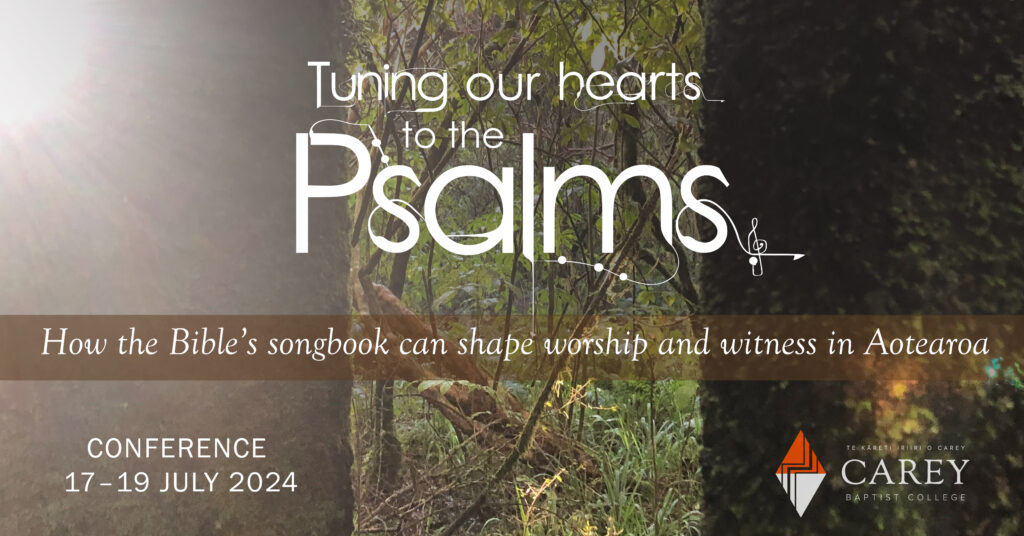…the Psalms can help
Dr Michael Rhodes
Let’s start with a game. Using these words, and only these words, write down a sentence explaining what you plan to do after reading this article.

My students often come up with sentences like “I want go bed!” or “I go car fast!” Not exactly Shakespeare, but it gets the job done.
Now, using these words, and only these words, write down a few sentences that explain your relationship with one of your parents.
How’d you do this time? Whatever you wrote, I’m guessing you struggled to tell the complex truth about that relationship.
The words in the box are from a list of the first 100 words English speaking children learn. They’re good words, important words, words we need. When English-speaking children first learn them, it’s adorable. In the mouth of a toddler “I want go fast” is pretty cute.
But if my kids still talk that way at 25, it won’t be cute at all . . . especially if they’re on a date, or in a job interview, or trying to resolve a deep conflict with a friend. We need the first words we gain as children, but we need more than our first words if we’re going to grow up.[1]
Following Jesus requires us to learn the language we need for our relationship with God. Part of discipleship involves growing towards greater fluency in that language. And out of his outrageous generosity, God has given us an entire biblical book filled with “language lessons” to help us grow in our fluency. I’m talking about the Psalms.
Think about it. The Bible is God’s Word to us. But the way we receive that word depends on the kind of words we’re reading. If you read a command in the Bible, how do you receive it? By obeying it. If you read a truth about God in the Bible, how do you receive it? By believing it.
But in the Psalms, God’s Word includes 150 prayers and songs. How do you receive a prayerbook? You pray it! How do you receive a hymnal? You sing it! If Scripture is God’s Word, then in the psalms we discover God speaks our language and has given us scripts to use as language lessons to help us grow in our relationship with him.
Some of these God-given language lessons shock us. For instance, we expect God to teach us how to praise. But who would have expected God to teach us how to rage?
Rouse yourself! Why do you sleep, O Lord?
Awake, do not cast us off forever!
Why do you hide your face?
Why do you forget our affliction and oppression?
…
Rise up, come to our help.
Redeem us for the sake of your steadfast love.
(Psa 44:23-24, 26)
The psalms offer us honest, emotional, poetic scripts that put words of praise, confession, exasperation, anger, pain, grief, despair, and joy in our mouths. They offer us a path to gain the language we need for life with God.
These psalms were written in the Hebrew language using ancient poetic forms and imagery. But the New Testament tells us God’s grand vision is for each of us to worship in our own mother tongues (Rev 7:9). Because of this, part of our task is to gather around the psalms and then imagine what it would sound like to sing and pray them in our own mother tongues and cultural forms.
That’s exactly what we’re going to do at Carey Baptist’s Psalms conference July 17-19. Internationally renowned psalms scholars like Ellen Davis, Brent Strawn, Rico Villanueva, and Jill Firth will help us dig deeply into these ancient prayers and songs. Te Hira and Anameka Paenga will help us hear and experience how the psalms have been woven together with Māori performing arts in Aotearoa. Old Testament scholar Brian Kolia will help us reflect on how the psalms have taken root in his own Samoan context. We will sing and pray the psalms together. And then, workshop leaders will help us write new songs and prayers in the mother tongues and cultural forms of Aotearoa, re-imagine leading worship in light of the psalms, consider the difference the psalms make for preaching and pastoral care, and more. Join us!

Lecturer – Old Testament
[1] This entire metaphor is adapted from Brent Strawn’s metaphor of the Old Testament being “like a language” in The Old Testament is Dying. Brent will be presenting one of our keynotes at the upcoming Psalms conference.
Join us for our three-day conference in July exploring how the Psalms can inspire Christian worship and shape God’s people here in Aotearoa. The conference will gather a range of Christian leaders including students, pastors, worship leaders, scholars, musicians, poets, and creatives to explore the Bible’s songbook and prayerbook.
You don’t want to miss this!

0 Comments